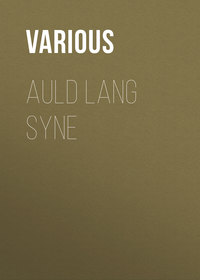
Chambers's Journal of Popular Literature, Science, and Art, No. 715
On sunny mornings, when the lads rode unexpectedly into the courtyard of Enderby, there would be a whir-r-r-r of pigeons, lighting on the gabled roof; a blaze of sunshine on the great wych-elms; a murmur of bees; a smell of fruit and flowers; white-haired Sir Vincent standing in a stable-door; over the garden wall, Deborah and Margaret flying along the garden walk with arms linked in the 'maddest merriest dance,' set to the music of boisterous laughter. Those were happy days.
PART II. – NOON
CHAPTER THE FIRST
'Hath he gone, Lady Deb? Hath Finton gone?' It was Dame Marjory who spoke, treading cautiously as she entered the young mistress's presence.
Deborah tossed her head, and gave a short laugh. 'Ay; he blustered, though. It is the third time he has come to dun father. My dame, these are hard times; but all may yet be well. Look you, I have saved so much for father; if Finton could see it, how his eyes would glitter like a wolf's. I hate that man; I hate all money-hunters. I care not if it be the law or not; it is dirty work! Take you this gold, dame; hide it well, lest I covet to buy a new gay scarf like Mistress Dinnage's. Away with it! and let me see the stuff no more.'
Dame Marjory took the gold, but she looked back over her shoulder, and her old eyes gleamed: 'Thou to want for what Jordan's daughter has for askin'!' she said. 'What right has Mistress Dinnage to flaunt in silken scarfs – and my child, my mistress, my lady "rose o' Enderby" to pine and pine? My child' – and the old woman faced Deborah, and the hot fierce tears welled into her eyes – 'I was wont to dress thee better than a queen; now, look at thy dress! What right, what call hath Sir Vincent Fleming's daughter to wear such dress as thine? A gipsy hag would scorn it! An' thy poor mother would have cursed the day that saw thee in this strait.'
'Hush, Marjory – hush!'
'I will not hush! It is thy father's an' thy brother's sin. I will not hush! O child, child, my heart is harried for thee!' And the old woman fell from her vehemence, and began to weep most bitterly.
Deborah softened at that; she flew to her nurse's side in wonderment, and kneeled at her feet in tender trouble. 'Dame, dame!' she said, 'it is not thy habit to give way to tears – and all for me, for me, dear dame, who am not worthy to have thee shed a tear! Hearken! Do you think I care to flaunt in silks? Do you think indeed Sir Vincent Fleming's daughter would wear fine feathers while he owed a penny? You might then weep for shame. But I am too proud for that. Now kiss me; and do not weep, oldest, truest friend. I cannot have thee weep!' Impossible to describe the tenderness of tone in those last words. Some thought Deborah Fleming cold, hard, haughty; they would not have thought so then.
Left alone, the girl resumed her gay debonair air. She gazed at herself in one of the long mirrors; she smiled and courtesied low, in mockery; then drawing herself up, she gazed again. Now Deborah would utter her thoughts aloud; it was a way she had. Regarding herself, she said: 'Nay; you are not fit; you cut a sorry figure in the world. She says truly. Yet what would you have me do? Beg borrowed plumes? Use ill-gotten gains? Would Deborah Fleming be the fairer for that? The fairer, perchance, but not the nobler. Oh, you are a sorry bird, Deb! The old barn-hen has a richer dress than you.' Then again, jerking her head upward once, twice, thrice: 'No wonder Kingston Fleming does not love you. "Master Kingston Fleming!"' she added – and her lip curled with superb scorn – 'loves fine dresses and silk shoes. He loves to see "beauty go beautifully." I am not a "Mistress May" or "Mistress Blancheflower."' With that, Deborah shot off all her satire; and laughing, tripped from the room.
In a few moments more she was running with the fleet foot of her childhood across meadow and holt, gay as a skylark. Presently she stopped, for in her course, with her back to a tree, stood a tall gipsy woman, with a red and yellow scarf upon her head. 'What do you here?' asked Deborah haughtily. The old scene in the camp came back; the fugitive retreat at night; she and Charlie and the old beldam huddled in a covered cart together; and outside, the tramp, tramp of horses and of men, and the mysterious jingle of pots and kettles, and the angry blows received from the old beldam for the noise she and Charlie made. The gipsy too recognised Deborah: this was not the child, though, who eyed her through the gate, but a proud imperious lady. In spite of the plain rough dress, the woman, with the nice discernment of a peasant and a gipsy, knew the lady, and the Lady of Enderby to boot. With unabashed impudence the gipsy stepped forward: 'I was waitin' to see ye, pretty lady.'
'And what do you want with me?' asked Deborah. 'This place is not for such as you. Honest poor folk may seek me here, and welcome; not gipsy vagabonds and thieves. If you have a petition, refer it to the back door and the cook, not to Mistress Fleming.'
The woman turned aside her head; for the moment her dark face was distorted by impotent rage and passion; but when again turned on Deborah, it was calm. She darted forward and clasped her hands, for Deborah was passing on.
'I am no thief,' said the woman, with shortened breath. 'I am an honest woman, lady, an' honester than many folk that live in great housen, like yonder. Pretty lady, don't be so hard on the poor gipsy. I've had troubles I tell ye, to which yours are nought – an' I don't ask yer pity.'
'Then what do you ask?' asked Deborah, turning full upon her.
'Yer hand – to let me see yer hand.'
'For the sake of gold! I have no gold to give you.'
'Nay, for no gold,' said the woman eagerly; 'but to read yer fate. A silver piece will do it. There! I will tell ye yer fortune for that.'
'And to what end? Have you an interest in me? in one whom you would have gladly lured away to a life of sin and misery? or as a hostage for my father's gold? You have done me grievous wrong. You take too much heed by half to the interests of the Flemings, woman; it is for no good.'
'Yes,' said the gipsy, in a strange low tone, 'I take interest in ye, but more in yours. Lady, let me see yer hand. I tell ye I have interest in yer fate, and in the fate o' one yer soul loves. Come!'
'You shall not wheedle me into it,' said Deborah. 'If I consent to let you, it will be of mine own free-will and after thought, not from words of yours. Some tell me it is vain; some say that fortune-telling sells you to the evil one – that it is grievous sin to seek your fate by signs and stars. I am not of these opinions.' The girl seemed talking to herself; the gipsy watched her keenly.
'Yes,' said Deborah, looking up and full at her, 'you shall tell my fortune. But can you trust me for the money?'
'Yes.'
'And why?'
'Because ye can't tell a lie.'
'That is well. I believe in witchcraft; this is why I hear you. Had you not come here, I would sooner or later have sought you, because time is slow, is slow, woman, and I want to know my fate! I will not say God forgive me: it seems almost mockery to ask forgiveness on what my heart knows to be wrong.'
'Wrong, lady?'
'Yes, wrong!' cried the maid, striking her foot on the ground. With that she held out her hand, a pink palm and tender lines, for the witch-woman's mystic reading. They both stood silent – the gipsy gazing downwards; Deborah gazing on the weird countenance before her, while the rich blood spread and deepened on her own with timidity and with shame. 'What do you see?' asked Deborah at length, with curling lip. 'I scarce believe you; it seems too vain!'
Then answered the gipsy woman, in low strange tones: 'You will be a great lady yet – ay, greater than Mistress Fleming. Ye will not go far to find yer greatness, either – it will meet ye at yer own gates; love and greatness will come hand in hand.'
Deborah's eyes sparkled. Then she said: 'Woman, that cannot be!' Then with the blood mounting to her brow like flame: 'What did you say – of one whom my soul loves? Who is he?'
'A fair tall youth. I know his title; but the title, look ye, will never be yours.'
'Then I care for nought!' said Deborah Fleming, and she flung away the gipsy's hand. 'Your craft is wanting. It is a vain, lying, deceitful craft! Look ye, Deborah Fleming will never be your great man's wife! You lie! I love power and riches; but I scorn them as you would foretell them to me. Gipsy, I have had enough of your fortunes and of you!'
She was gone – that proud young Mistress Fleming, whose will had never been crossed or curbed; tall beautiful young ash, that would yield neither to breeze nor tempest, but held its head so high.
The gipsy gazed after her; fierce passions made the woman's breast pant. 'I hate her!' she gasped between her clenched teeth – 'I hate her! I hate all thy black race, my lass. But ye shall lick the dust, proud Mistress – I see it on yer palm. Ye shall have the pale-faced sweetheart, but it shall be across ruin and disgrace; an' by settin' yer foot on the two dead bodies o' them ye love like yer own soul, ye shall climb to yer lad. Take him! I wish ye joy o' him then! I care not, so long as I ha' vengeance, vengeance, vengeance!' and the wild woman's eyes glared with a fire like madness. She turned towards Enderby, and shook her clenched fist that way. 'I will have vengeance then, for all the dark hours thou hast caused me, pretty daughter o' mine! I will see thy boy dabbled in his blood; an' may thy dead eyes be opened to see it too. Heaven's malison light on thee!'
THE ROYAL NAVAL RESERVE AND ROYAL NAVAL VOLUNTEERS
Whenever England is engaged in a naval war or any war including maritime operations on an extensive scale, a difficult problem has to be solved – how to man the ships? In the army, every regiment has a sort of corporate existence; it never dies – the exceptions, the actual disbandment of a regiment, being very rare indeed. The number of men varies according to the peace-footing or the war-footing at which the regiment may stand at any particular date; but at all times many hundreds of trained men belong to it. Not so in regard to a ship of war. When not wanted for warlike, cruising, or other service, it is 'out of commission;' all the officers and men are paid off; and the ship, moored at Portsmouth or some other naval station, is stripped of most of its paraphernalia, ammunition, and stores, and 'laid up in ordinary,' with a few dockyard or harbour men to take care of it. When wanted again for active service, it has to be 'put in commission' again; commissioned officers and crew have alike to be engaged anew, just as though the ship were fresh from the builder's hands. Officers are always plentiful enough, the number on half-pay in peace-time being very large – nearly the whole of them desirous of engaging in active service on full pay. With the sailors, the A.B. (able-bodied) and common seamen, the case is different; competition for their services being kept up by the owners of large commercial vessels.
The difficulty of suddenly obtaining a large additional number of seamen was seriously felt at the commencement of the Crimean war; but the Admiralty solved the perplexity by organising a Royal Naval Reserve, and obtained the sanction of parliament for the necessary outlay. The Reserve was to comprise men who, provided they attend drill a certain number of days in each year, may follow any avocation they please at other times; it being a well-understood matter of agreement that they shall be ready for active service on the breaking out of war. Of course ship-owners did not at first relish this scheme, seeing that it established a new kind of competition against them for hands; but in practice no particular inconvenience has resulted. The men are permitted to take their drill whenever it best suits them; twenty-eight days per year all at one time, or in periods of seven, fourteen, or twenty-one days. Certain qualifications are insisted on before enrolment, including a medical examination in regard to health. The 'retainer' which the seaman receives, and the prospect of pension, operate as inducements to steadiness and against desertion; and it is known that this is exercising a beneficial effect on the mercantile marine, seeing that ship-owners now give a preference to Royal Naval Reserve men whenever they can get them. Mixing with the regular men-of-war's men during the one month's drill is also found to be beneficial; and some of the Reserve go through all their exercises with as much steadiness as a regular crew. The Admiralty are empowered by parliament to engage thirty thousand men in this way; the Reserve now comprises twenty thousand; and it is believed that there would be no great difficulty in making up the full complement.
In a recently published Report by the Admiral Superintendent of the body, the following remarks occur: 'After all the expense the country has been put to, and will have to bear prospectively, for the organisation and maintenance of the Royal Naval Reserve, will the men be forthcoming when wanted? This can only be tested in the day of trial, when the Queen's Proclamation will call the Reserve out for active service; but I hold that we have as reliable guarantees that the men will present themselves, as under any system that could be devised on the basis of voluntary service. The men have entered on an engagement to serve, they have received drill-pay and retainers under this engagement, and without being branded by public opinion, could not shrink from the fulfilment of their duty. It would be doing an injustice to the élite of the merchant service to suppose that they are entirely devoid of patriotism, and would not desire to serve in defence of their country. Their prejudices against service in the royal navy have been in a great measure removed; and they would feel themselves competent from previous training to work the guns and handle a rifle and cutlass.'
Very little has yet been done to take the Reserve on a cruise for rehearsal or practice. A merchant seaman, to fit him for the Reserve, requires chiefly to be made familiar with the great-gun exercise, to handle the sword and rifle, to be steady and silent under instruction, and to obey implicitly the orders he receives. This training he will receive on board the drill-ships especially set apart for the purpose, or at batteries representing the section of a ship, quite as well as in a man-of-war. The Reserve of the first class (for the force is divided into classes) have already been seamen in the merchant service, and do not require instruction in seamanship.
The drill-ships and the practice-batteries are distributed pretty well around the coasts of the United Kingdom at about forty different stations – eight in Scotland, seven in Ireland, and the rest in England and Wales. There are nearly always some men on drill at every ship and battery; but it is noteworthy that in the fishing season in certain parts of Scotland and in the Isles the drill is pretty nearly in abeyance – herrings being more important just then than big guns and cutlasses. The first-class men are far more numerous than the second, shewing that the main body are already fairly good seamen before they enter the Reserve. As to numbers in different places, the drill-ships near busy ports are naturally more frequented than those off a thinly populated coast. The President in the Thames, the Eagle at Liverpool, the Unicorn at Dundee, the Netley at Inverness, the Castor at North Shields, the Dædalus at Bristol, are among the drill-ships which receive the greatest number of enrolled men for drill during the year. Liverpool takes the lead in the number of outsiders (seven-eighths of whom, however, are already merchant seamen) who apply for enrolment. Half the whole number in the force are under thirty years of age, young men with plenty of health and strength in them. Rather less than half are at home or in the coasting-trade; rather more than half voyaging in foreign seas, mostly, however, on short voyages that will end within a month. More of these voyages are to the Baltic and the North Sea than to any other waters; the next in numbers are those to the Mediterranean and the Black Sea.
The officers who command or control the body comprise lieutenants, sub-lieutenants, engineers, assistant-engineers, and midshipmen. The lieutenants must have served as sub-lieutenants one year or upwards; most of them have been duly qualified masters of merchant-ships. Midshipmen are promoted to the rank of sub-lieutenant on the fulfilment of prescribed conditions as to efficiency, &c.
The men of the first-class now receive a grant of a suit of clothing on enrolment and re-enrolment – an arrangement which they much relish, as an improvement on the plan at first adopted, when each man was left to dress pretty much at random, provided he looked something like a sailor. Nearly all the A.B.s in the mercantile marine have joined or offered to join the body; thus affording proof that it is popular. The second-class Reserve are mostly fishermen, who are unacquainted with square-rigged vessels, and are unaccustomed to long absence from their homes; but they are fitted for coast-defence service. In Scotland and especially in the Shetlands, the second-class serves as a stepping-stone to the first. Their pay is less than that of the first-class, and they have no claim for pension; therefore they have an inducement to try for promotion. The authorities have had under consideration the question whether to establish a third-class, to consist of boys belonging to the mercantile training-ships; but no decision appears at present to have been arrived at.
In a discussion which took place at the Royal United Service Institution some time back, it was generally admitted that our band of hardy fishermen might be made to form an excellent Naval Reserve irrespective of regular seamen of the mercantile marine. 'There are,' it was urged, 'one hundred and fifty thousand men and fifteen thousand boys employed in the fisheries of the United Kingdom; besides the large number in the Canadian Dominion and Newfoundland. It would not be difficult to raise from among our large population of bonâ fide fishermen a Reserve equal to the full standard originally recommended. The drill could be taught in the most efficient manner and with the least expense to the government by sending a gunboat to visit the fishing-boats at the slack season. The local knowledge possessed by the fishermen would be of immense value in coast-defence; and there is an advantage in their having fixed places of residence and never sailing under a foreign flag; added to which is the value of their physical strength, hardy and domesticated habits, and good character.'
And now a few words for the Royal Naval Artillery Volunteers, another body intended for defensive purposes in the event of war. There is a corps known as the Coast Guard, to fulfil service on the coast in case of invasion; and under the same kind of control are the Royal Naval Coast Volunteers. These two bodies together comprise nearly twenty thousand men, all good seamen, and receiving liberal pay. But there is something more peculiar about the Royal Naval Artillery Volunteers likely to interest general readers. They are virtually an offshoot or supplement of the Volunteer Rifles, intended solely for defence against invaders. Who the invader is to be we do not know; haply and happily we may never know; but a thought on the subject now and then is reasonable enough. Our coast-line is very extensive, and needs watching at a considerable number of unprotected spots. Besides regular troops, Volunteer infantry, and cruising war-ships, it has long been felt that a naval artillery corps would be a useful addition for serving in gunboats and mortar rafts, and operating in the new art of torpedo-defensive warfare. A small Marine Volunteer Corps was raised at Hastings about 1863; others were afterwards raised in London, Liverpool, and Bristol; and at length, in 1873, parliament passed an Act sanctioning the formation of a body to be known as the Royal Naval Artillery Volunteers. So far from being men who are paid for their services, these Volunteers have to provide their own uniform and to pay a small subscription to a corps fund; they really enter into the matter con amore, giving time, exertion, and some money for a purpose which may eventually be valuable to our common country. The government provide ships, great guns, rifles, pistols, cutlasses, and other gear for practice. Whether artisans, yachtsmen, or rowing-men would join the corps in any considerable number, could only be known by awaiting the result; but it turns out that clerks – mostly in commercial firms – come forward more readily than any other class. They like the bodily exercise and the open air after many hours of desk-plodding.
The idea is to render these Volunteers handy in the defence of rivers and estuaries, by the management of floating-batteries, armed rafts, and torpedoes. In practising with big guns at such places as London, Liverpool, and Bristol, there are of course neither real shot nor blank cartridges actually propelled from the weapon; a flash and a slight report are all; to run out, point, fire, and re-adjust are the exercises practised; and this is no small work with a sixty-pounder gun. After this big-gun drill, the Volunteers go through their rifle, cutlass, and pistol drill; and the young men are all the better for two or three hours of muscular exercise and ocular training. They wear a useful blue-and-white uniform while thus engaged. The Rainbow gunboat in the Thames off Somerset House, the President in the West India Docks, and two similar vessels at Liverpool and Bristol, are set apart by the Admiralty as drill-ships for the purpose. The total strength is somewhat under seven hundred men, with a naval instructor, petty-officer instructors, lieutenants, sub-lieutenants, shipkeepers, armourers, &c.
Even if never really wanted for river and estuary defence, these energetic young men will have no reason, bodily or mental, to regret the step they have taken – the devotion of a couple of hours occasionally after office or warehouse time to a right good exercise of muscle, nerve, brain, eyesight, attention, and intelligence. It is a national comfort to know that rifle and artillery volunteering are alike free from many of the evils of young men's recreations; they do not tempt to drinking, to betting, nor to dissolute companionship. All honour to those who promoted, and to those who carry out the movement.
TIM HARGATON'S COURTSHIP
He was mother's factotum, big Tim Hargaton. I do not know how she could have managed the farm without his clear head and sound judgment to guide her. He had the name of being the closest hand at a bargain and the best judge of a 'baste' in Innishowen; and I think he deserved it; for mother very rarely lost upon her speculations in cattle, and our animals were famed for their beauty. Tim was not wholly an Innishowen man. By his mother's side he claimed descent from the Scottish settlers of the opposite coast, and much of his cautiousness and shrewdness could be traced to this infusion of kindly Scottish blood. We children had rather an awe of Tim. He ruled the outer world of our homestead with a rod of iron. Woe betide the delinquent who ventured into the garden before the 'house' had been supplied with fruit for preserving! Woe be to us if with profane hands we assaulted his beloved grapes or ravaged his trim flower-beds! I daresay it was very good for us that some one was set in authority over the garden and farm-yard, for we were allowed quite enough freedom indoors, fatherless tomboys that we were. But years passed by; one by one we grew to womanhood. I, the eldest, left home first – to return first; more alone for having been so happy, too happy for a little while. When I returned, a widow, the younger birds had flown from the nest. Mother had no one left but me, and she was growing old; so I cast in my own and my boy's lot with her, and soon became thoroughly acquainted with Tim Hargaton. To him I was 'the young mistress' or 'Miss Ellen;' and I own I felt often at a disadvantage with him. His quiet knowledge of subjects I was utterly ignorant of, his cool rejection of my farming theories, his almost certain success in all his ventures, overawed me; and after a struggle or two I gave in.









